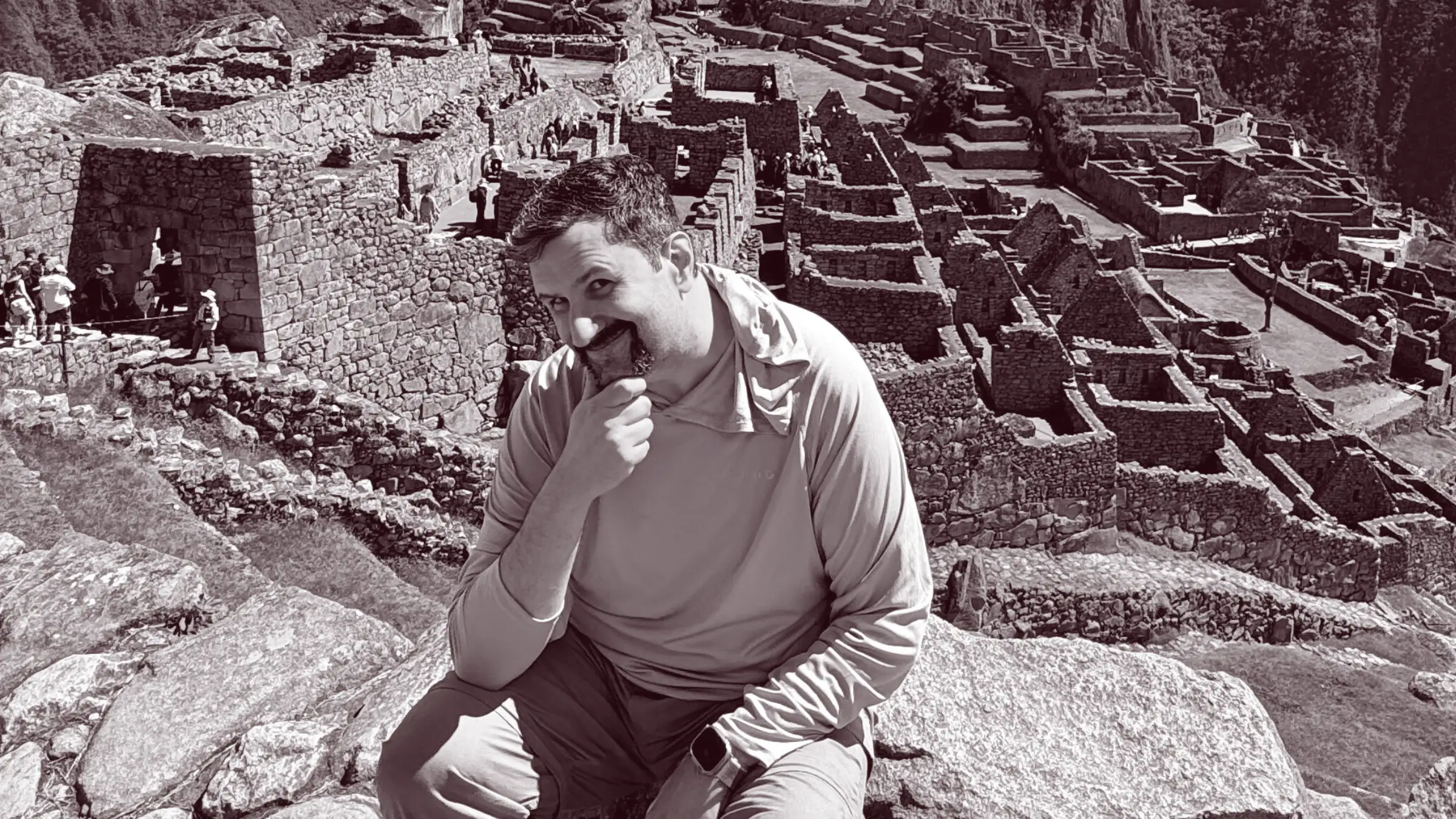I visited Machu Picchu 81 days ago. I understand it as well as I did 82 days ago. In fact, I understand it less.
That’s why I’ve taken so long to write this post. I still struggle to describe the nonphysical part of the experience. So many of the words other people use to describe Machu Picchu simply don’t capture my feelings.
- Spiritual means supernatural.1
- Metaphysical means supernatural with crystals.
- Mystical means supernatural with unicorns.
Finding the Right Words
There are only two terms that accurately describe my experience at Machu Picchu. The first is groin-grabblingly transcendent.

My editor rejected that.

That leaves me with sublime. I’m thinking specifically about how Enlightenment philosopher Immanuel Kant2 defined the word, not how it’s used broadly today.
Whereas the beautiful is limited, the sublime is limitless, so that the mind in the presence of the sublime, attempting to imagine what it cannot, has pain in the failure but pleasure in contemplating the immensity of the attempt.
Immanuel Kant, “Critique of Pure Reason”
I know what you’re thinking: What the fuck do you know about philosophy or sublimity, Dave? Well, for one thing, I think you should watch your fucking language. For another, travel writer Mark Adams came to this realization first.3
For the first time since dropping out of graduate school, I remembered an unpleasant weekend spent struggling to comprehend the philosopher Immanuel Kant’s explanation of the difference between calling something beautiful and calling it sublime. Nowadays, we throw around the word “sublime” to describe gooey desserts or overpriced handbags.
In Kant’s epistemology, it meant something limitless, an aesthetically pleasing entity so huge that it made the perceiver’s head hurt. Machu Picchu isn’t just beautiful, it’s sublime.
Mark Adams, “Turn Right at Machu Picchu”
Adams, referring to Kant, found the most appropriate word — perhaps the only word — to describe what I felt at Machu Picchu.
There’s No Place Like Place
Why was Machu Picchu so agonizing to understand but so wonderful to contemplate? Because it blew up my understanding of what a “place” is.
I think of places as distinct things.
- My home is a place.
- Our synagogue is a place.
- San Francisco is a place.
- The moon is a place.
- Pike’s Peak is a place.
- Australia is a place.
- Barcelona is a place.4
At Machu Picchu, I saw that the Incas didn’t make these differentiations. The built environment (like temples, living spaces, terraces, irrigation systems, and roads) was aligned with the natural environment (like the mountains and the movements of the sun, moon, and stars).
These connections weren’t limited to the area around Machu Picchu. The Incas didn’t have modern surveying equipment or a written language, but almost everything they built was aligned with manufactured or natural features long distances away.
What happens to the concept of “place” when every place is integrated into all other places? Is my kitchen no longer a discrete space but part of something larger, connected not just to my house but to grocery stores, distribution routes, farms, factories, sunlight, soil, and whatever layer of hell Brussells spouts come from?
Contemplating all that is like drinking a Slurpee. Your brain hurts, yet you want to keep sipping.
Everywhere Is Everywhere
I had read about these alignments before visiting Machu Picchu, but I didn’t truly appreciate them till I was there with a guide pointing them out. Seeing was believing, and believing was overwhelming. Every engineering decision was deliberate and precise, and every pebble and blade of grass seemed to have been positioned for a purpose.
That doesn’t happen by accident. It comes from a cultural understanding of “place” fundamentally different from ours, based on the interconnectedness of everything at a subatomic level.5
To put that in the form of a Zen kōan: Machu Picchu is one place and every place.
Now you see why I keep coming back to the word sublime. Machu Picchu challenged me to look at the world differently. I haven’t gained a different perspective on things; rather, I’ve become aware that there is a different perspective I may never see or comprehend. You can interpret that last sentence literally or figuratively. Both ways are correct.
Mark Adams,6 the author I quoted above, has the perfect analogy:
Anyone who has ever studied string theory in physics may have some idea of how I felt. You walk into class one day confident that you live in a three-dimensional world. An hour later you walk out with only the faintest grasp of the concept that there are actually nine or ten dimensions and, quite possibly, parallel universes on top of our own.
Mark Adams, “Turn Right at Machu Picchu”
Will I ever truly understand what Machu Picchu means? No. But I’m fine with that. There’s more to be learned by appreciating this mystery than by solving it.
The Inevitable Footnotes
- As you may recall, I’m a skeptic about such things. ↩︎
- Here’s a short educational video about Kant and other philosophers: link. ↩︎
- I can’t recommend his book, “Turn Right at Machu Picchu,” enough. Buy it now. Do not pass Go. Do not pay $200. ↩︎
- A massively overrated place that is inferior to Madrid in every way. ↩︎
- Let’s pretend I’m smart enough to understand subatomic entanglement. ↩︎
- Why haven’t you bought his book yet? Did you not see the earlier footnote? ↩︎

